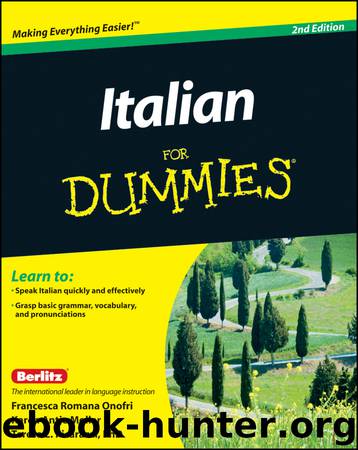Italian For Dummies by Francesca Romana Onofri

Author:Francesca Romana Onofri
Language: eng
Format: epub
Publisher: Wiley
Published: 2011-09-22T04:00:00+00:00
Chapter 10
Taking Care of Business and Telecommunicating
In This Chapter
Phoning and texting
Making reservations and appointments over the phone
Getting through to the person you want and leaving messages
Using the past tense
In this chapter you encounter expressions and phrases that relate to telephones and telecommunication — for example, how to behave when someone calls you and how to leave a message. In addition, I show you some samples of common phone dialogues.
Phoning Made Simple
Pronto! (prohn-toh) (Hello!) is the first thing you hear when you talk to an Italian on the phone. In most languages, you answer the phone with the same word you use for saying hello in person, but in Italian, you use pronto to say hello only on the phone.
You can answer the phone and say “Pronto. Chi parla?” (prohn-toh kee pahr-lah) (Hello, who’s speaking?)
And a typical response might be “Pronto! Sono Sabrina. C’è Stefano?” (prohn-toh soh-noh sah-bree-nah cheh steh-fah-noh). (Hello! This is Sabrina. Is Stefano there?)
You can also say, “Sono Susanna. Posso parlare con Michele per favore?” (soh-noh sooh-sahn-nah pohs-soh pahr-lah-reh kohn mee-keh-leh pehr fah-voh-reh) (This is Susan. May I please speak with Michael?)
Connecting via cellphones, texts, and Skype
Italians love their cellulari (chehl-looh-lah-ree) (cellphones), there’s no doubt about that. They were one of the first cultures to embrace full force the telefonino (teh-leh-foh-nee-noh) (little phone) back in the eighties, when they adopted this useful accessory as a fashion.
Cellphones
When you’re in Italy you need to have your own cell phone because public phones are hard to find and hotel phones are very expensive to use. If you take your phone with you from, say, the United States, make certain that it will work in Italy and that calls won’t cost you a mint. Of course, you can buy a phone when you get there. If you buy one, phone time can be purchased two ways at the local tabaccaio (tah-bahk-kahy-oh) (tobacconist). You can either purchase una scheda telefonica (ooh-nah skeh-dah teh-leh-foh-nee-kah) (phone card), or you can ask the salesperson to charge your phone for you by putting on a specific number of minutes or euros. You can do the same thing at any branch of the phone store where you bought your cell phone.
Text messaging
Because Italians tend to text more frequently than make phone calls these days (because it is so much cheaper and also trendy), you should know how to say a couple of important things, such as “messaggino” (mehs-sahj-jee-noh) or “sms” (ehs-seh-ehm-meh-ehs-seh) (text message), and “mandami un messaggino” (mahn-dah-mee oohn mehs-sahj-jee-noh) (“Text me.” Literally: “Send me a text message.”)
Using the Internet to connect
All cities have their share of Internet stations, where you can pay a per-minute fee to use the Internet. All you have to ask is “Posso usare l’Internet?” (pohs-soh ooh-zah-reh leen-tehr-neht) (May I use the Internet?) whereupon you will be asked for un documento (oohn dohk-ooh-mehn-toh) (identification) and assigned to a computer station. There, you can Skype or e-mail to your heart’s content.
Here are a couple more useful phone phrases:
Avete
Download
This site does not store any files on its server. We only index and link to content provided by other sites. Please contact the content providers to delete copyright contents if any and email us, we'll remove relevant links or contents immediately.
Housekeeping by Marilynne Robinson(4436)
Papillon (English) by Henri Charrière(4263)
The Poetry of Pablo Neruda by Pablo Neruda(4099)
World without end by Ken Follett(3475)
TCP IP by Todd Lammle(3180)
Fluent Forever: How to Learn Any Language Fast and Never Forget It by Gabriel Wyner(3079)
The Rape Of Nanking by Iris Chang(2815)
How Proust Can Change Your Life by Alain De Botton(2808)
The Alchemist by Paulo Coelho(2690)
The Partner by John Grisham(2396)
Two lives by Helen Naylor(2297)
Hitler by Ian Kershaw(2194)
Yerma by Federico García Lorca(2063)
Sophie's World by Jostein Gaarder(2018)
Smilla's Sense of Snow by Peter Hoeg(1939)
Merriam-Webster's Pocket Dictionary by Merriam-Webster(1931)
Twilight of Idols and Anti-Christ by Friedrich Nietzsche(1892)
Il cavaliere inesistente by Italo Calvino(1855)
Deep Writing by Eric Maisel(1818)
